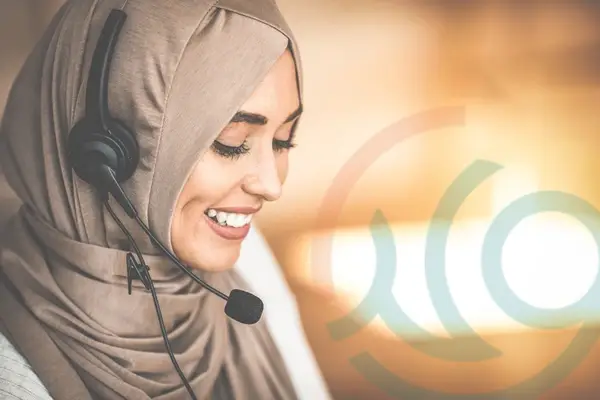Waad Center for Health and Wellness
Waad Center offers psychological counseling programs for individuals experiencing psychological, behavioral, or family-related disorders—all within a safe and completely confidential environment. Our therapeutic programs are carefully designed to address a wide range of psychological and social needs. They are delivered by highly experienced mental health professionals who are dedicated to supporting every essential aspect required to create real, lasting change in behavioral patterns and improve the overall quality of life for our valued beneficiaries.
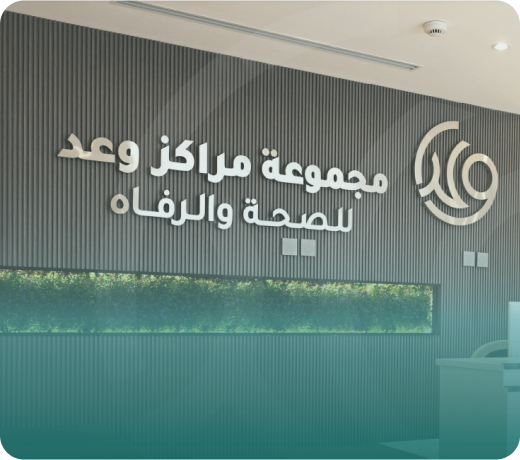
Therapeutic programs used
CBT is a structured psychological treatment program that helps individuals modify their behavior by learning how to manage their daily thoughts and emotions in a healthy way.
DBT is a specialized form of psychotherapy designed to help individuals manage intense emotions and reduce conflict in their relationships.
ACT is a modern form of psychotherapy that aims to help individuals accept thoughts and emotions that are beyond their control, while committing to actions that lead to a meaningful and fulfilling life.
Psychodynamic therapy is a form of psychotherapy that focuses on exploring the unconscious psychological forces that influence a person’s thoughts, feelings, and behaviors.
The Behavior Modification Program is a structured approach aimed at changing undesirable behaviors by using a variety of proven techniques to replace them with more positive and appropriate behaviors.
Services

Anger Management
Although anger is a normal emotion, we all may experience intense feelings of anger from time to time. However, when a person struggles to control these emotions and finds that anger interferes with their ability to maintain healthy relationships or leads to stress and dissatisfaction in certain areas of their personal life, then this intense anger can create an emotional barrier that prevents individuals from fully and happily engaging in many aspects of life

Loss
Coping with Loss with the Support of “Waad” Psychological Therapy Center
Loss is a part of human life and can have a significant impact on mental health. This article explains how loss can affect individuals psychologically and emotionally, and highlights how psychological therapy can support mental well-being during such times. It also sheds light on the different types of loss and how the center can provide the necessary support to help affected individuals cope with their feelings of loss.

Depression
Understanding Depression and How to Cope with It
Depression is a psychological disorder characterized by persistent feelings of sadness and a loss of interest in daily activities. It can affect daily functioning and personal relationships. “Waad” Center provides specialized services for treating depression, with therapy known for its effectiveness in improving mental health. This article explains in detail the causes of depression and the available treatments, including psychotherapy, medication, and other techniques used to help individuals overcome depression.

Relationship Issues
“Waad” Psychological Therapy Center’s Solutions for Relationship Problems
Relationship issues can impact both mental and emotional well-being. This article outlines how the center offers innovative solutions to help individuals improve their relationships and communication with others. It highlights practical tips and methods that can enhance personal relationships and explains how psychological therapy can contribute to building healthier and more fulfilling connections.

Eating Disorders
Inpatient Rehabilitation Services
Inpatient rehabilitation refers to the therapeutic services clients receive while being admitted to our facility for a limited period. Waad offers inpatient rehabilitation services to treat addiction-related conditions.

- Cerebral palsy
- Traumatic brain injury (TBI)
- Spinal cord injuries
These are children who display repeated behavioral patterns that affect their interaction with others or their personal development, such as: aggression, excessive stubbornness, hyperactivity, or difficulties with focus and discipline.
Behavior modification aims to understand the causes of negative behaviors and apply scientific strategies that help the child acquire healthy behaviors and enhance their ability to interact positively within the family, school, and community.
These are disorders that affect the child’s behavior and daily relationships, and may result from psychological, environmental, or biological factors, such as: anxiety, depression, attention-deficit/hyperactivity disorder (ADHD), or aggressive and impulsive behavior.
Behavior modification aims to help the child understand their emotions and regulate their actions through individualized treatment programs that support their psychological and social development and improve their quality of life.
Early intervention makes a significant difference in the life of the child and their family.
Some children experience neurodevelopmental disorders such as Attention-Deficit/Hyperactivity Disorder (ADHD) or Autism Spectrum Disorder (ASD), which affect their ability to focus, organize, communicate, and engage socially.
Behavior modification is an effective tool to help them develop daily life skills, enhance independence, and reduce behaviors that hinder learning and social life.
Through individualized programs based on each child’s needs, they can be supported to reach their full potential in a safe and stimulating environment.
Some children struggle to acquire age-appropriate language skills, such as delayed word pronunciation, sentence formation, or understanding language.
Speech delay may be related to developmental, auditory, or environmental factors, and it directly affects the child’s communication and self-confidence.
Behavior modification, in combination with speech and language therapy sessions, helps support the child in developing their language abilities and improving their interaction with others in an effective and positive way.
Services
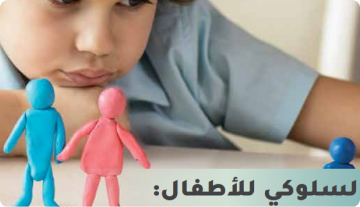
Behavioral Therapy for Children
Behavioral therapy for children focuses on the biological, psychological, and social components of mental, emotional, and developmental health disorders in children.
Consulting a child psychologist is essential when signs of mental health disorders appear, such as difficulty regulating emotions or feelings, disturbances in thinking or behavior, and changes in sleep or eating habits.
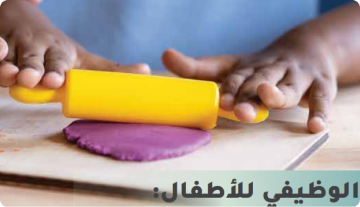
Occupational Therapy for Children
At Waad Centers, the Occupational Therapy Department — one of the modern allied medical sciences — helps children develop their motor, psychological, and cognitive skills, increasing their opportunities for growth and learning through play and daily life experiences.
The department also guides parents and anyone involved with the child on the best methods to achieve the highest level of performance possible based on the child’s abilities, suggesting environmental modifications and recommending assistive devices that can improve capabilities and prevent deterioration or the development of secondary disabilities.
At Waad, we are committed to providing all the necessary tools and equipment that help occupational therapists deliver their best efforts based on the latest scientific foundations, aiming to improve beneficiaries’ quality of life and enable them to perform their roles as independently as possible.
This includes supporting them with adaptive tools to use in daily tasks such as eating or writing, preventing secondary complications, and ensuring their self-reliance while acquiring essential life and self-care skills, in addition to engaging in leisure activities, hobbies, and productivity- or work-related skills.
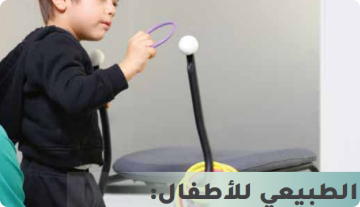
Physical Therapy for Children
The Physical Therapy Department at Waad Center specializes in rehabilitating children to improve and support their motor development through rehabilitation techniques, manual therapy, and hydrotherapy — with the goal of helping the child reach the highest possible level of independence in movement and daily activities.
Motor development, balance, joint range of motion, and muscle tone are evaluated by physical therapists using standardized assessments appropriate to the child’s symptoms, followed by the creation and implementation of the necessary treatment plan.
At Waad, we believe that early intervention in physical therapy helps beneficiaries achieve better results in a shorter time, due to the brain’s ability to compensate for motor impairments at a young age.
It also helps overcome motor development issues by teaching the child to control body movements, develop balance, neuromuscular coordination, motor planning, increase joint range of motion, improve muscle flexibility, prevent various secondary complications, and enhance their level of independence.
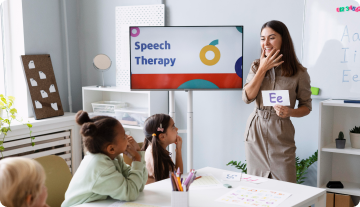
Speech and Language Therapy for Children
The Speech and Language Department at Waad Center for Health and Wellness plays an important role in improving functional skills and quality of life. It helps beneficiaries enhance their communication abilities with others, integrate into society, interact effectively, and express themselves confidently.
It also supports the development of self-esteem and contributes to social, emotional, academic growth, as well as success in school and work.
Speech and language pathologists rely on a set of standardized and non-standardized tools and assessments tailored to the individual’s condition and symptoms in order to build a structured and professional treatment plan that meets their needs.
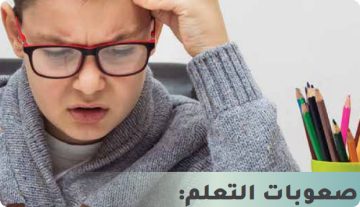
Learning Difficulties Services
The educational services programs at Waad Center are designed to enable each beneficiary with special educational needs to reach their full potential. Each beneficiary learns differently, which is why our educational programs include a variety of important services such as learning difficulties services, academic support, and developmental education programs that meet the individual needs of each beneficiary.
These are provided alongside vocational rehabilitation services, therapy, and modern classroom simulation technologies, offering the highest quality of education from ages 4 to 21.
The Learning Difficulties Program at Waad Center aims to address cases of individuals with normal intelligence levels whose academic performance is not attributed to any other disabilities, or environmental, cultural, or economic factors that may have affected their academic achievement.
The department strives to provide services that meet their needs based on standards aligned with global best practices, starting from screening and assessment to the intervention stage.
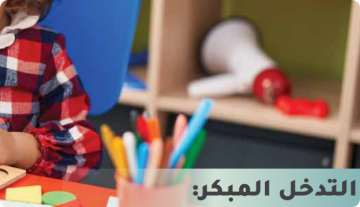
Early Intervention Program
The Early Intervention Program at Waad Center is a comprehensive program aimed at developing all aspects of a child’s cognitive, social, behavioral, motor, and language skills, as well as self-reliance abilities. The center utilizes the Denver Program for evaluating children. Through our team, individualized sessions and carefully tailored plans are created to suit each child’s needs, using strategies that enhance the child’s development during their early years.
One of the most distinctive features of the Early Intervention Programs at Waad Center is our specialists’ focus on family development and empowering them to actively participate in the therapeutic journey by providing them with the necessary information and equipping them with appropriate skills to support their child’s growth and make informed decisions at the right time.
The Early Intervention Programs at the center have been designed by professional specialists, based on our full awareness of the critical importance of early intervention during the first years of a child’s life, which undoubtedly contributes to the development of the child’s abilities and helps reduce or even prevent delays entirely.

Family Support Services
With a focus on continuity, our services at Waad Center work to care for, support, and preserve the family so that all children can grow up in a safe, healthy, and loving environment. Our services help empower the entire family, coordinate services with community partners, and connect them with a supportive network. We work with families to coordinate services that support health and well-being, improve healthcare outcomes, and enhance overall satisfaction.
Waad Center for Health & Wellness Team
Have a question? We're here to help
